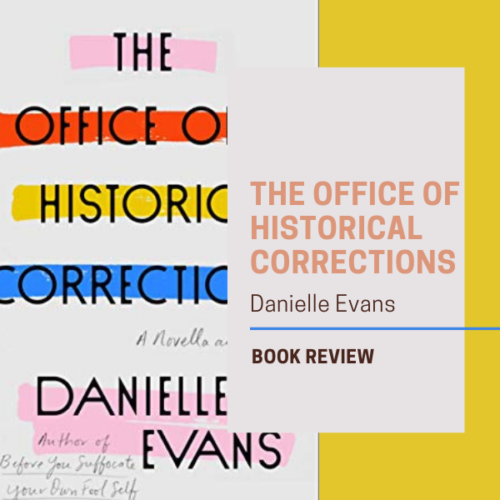The Office of Historical Corrections was published in December of 2020 by author, Danielle Evans. Roxane Gay calls Evans “the finest short story writer working today,” which leaves you with high expectations that Danielle Evans only shatters with her talent. Short stories are typically not what I pick up from my bookshelf. Honestly, I do not own more than five different short story collections but reading Danielle Evans sophomore collection makes me want to pick up her debut collection Before You Suffocate Your Own Fool Self.
In The Office of Historical Corrections Danielle Evans writes stories that center around complicated and unreliable characters through six short stories and one novella. In this second collection, Evans centers her stories around apologies and grief, specifically in relation to the Black characters she creates. Although the collection of stories seems extremely timely and in response to recent events, Evans states that the only story she wrote directly in response to events in the last few years was “Why Won’t Women Just Say What They Want.” With this in mind, every short story in this collection could be reread again and again to find more meaning.
Standout Short Stories
Among these short stories I found many favorites, but the stories that stood out to me were “Happily Ever After,” “Boys Go to Jupiter,” and “Alcatraz.” The reason I felt such a draw to these three stories is likely due to the timelines of the themes they exposed: racial profiling, problematic white women, and intergenerational trauma.
“Tell me what you would tell a white woman, her face said. A white woman with money, her clothes said. Please, her tone said.”- “Happily Ever After”
In “Happily Ever After,” Evans writes about Lyssa, a young woman grappling with the death of her mother from cancer. In every short story Evans begins by giving background information while the characters we read about seem to be engaging with a trivial everyday life. But then Evans hits you with the trauma that these characters are grieving. For Lyssa, she is grieving not only her mother but the trauma of trying to get treatment for her mother’s cancer while worrying about racial profiling and how she may be treated differently by the healthcare system if her mother and herself were white women.
“You take nothing for granted when the price of it is etched across the face of the person you love most, when you are born into a series of loans and know you will never be up to the cost of the debt.”- “Alcatraz”
In “Alcatraz” readers follow Cecelia, a woman who questions her mothers need to clean up her grandfather’s name after he was wrongfully sentenced to a prison sentence at Alcatraz when it was an active prison. Through Cecelia’s eyes, readers see how the intergenerational trauma of this wrongful sentence has affected her ability to hold a job and care for herself and daughter. However, upon being asked to visit Alcatraz with her mother after a move to the Bay Area, Cecelia begins to understand her mother’s fascination with clearing her grandfather’s name as visitors to this prison complex commercialize the trauma of so many families. One of the most notable passages from “Alcatraz” is Cecelia’s observation, “…you are entitled to food, clothing, shelter, and medical attention. Everything else is a privilege. I examined a scuff mark on the floor, noted how many people must have walked over this same ground, paid for the luxury of being reminded what privileges were.” Evans is full of these breathtaking passages throughout this collection of short stories and a novella.
Titular Novella
Many readers, including myself, are captivated by the titular novella “The Office of Historical Corrections” that looks at a new government agency with the sole purpose is to clear historical inaccuracy. As Evans notes in the novella, many people are unwilling to accept the past and how that transfers into the present and future. Most notably, Cassie, a representative for The Office of Historical Corrections is sent to Cherry Mill, Wisconsin to investigate the history of the death of a Black man who was driven out by white supremacists in the town. With the past of this town being dug up, surprising revelations come about with the citizens that are unwilling to accept them.
Overall, this collection is a standout and should be on everyone’s to be read list. Evans writes about topics that are all around us but in a way that has readers analyze the events around us and what we know. Although not every short story in this collection will be for you, there are so many reasons to pick up this book, one of them being for the incredible writing and the need to support Black authors and their amazing work.
Content Warnings: death of a family member, cancer, police brutality, gun violence, physical abuse, explicit racism, car accident, overdose, child missing/kidnapping, white supremacy.


